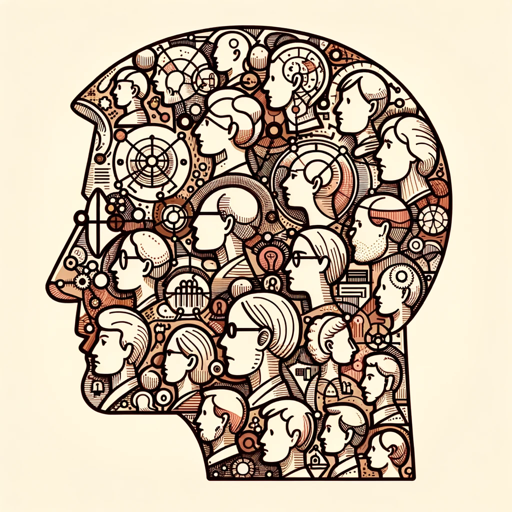Ontology Expert-AI-powered ontology extraction tool
AI-driven ontology extraction and modeling.
Extract ontology from this text:
How would you categorize these concepts?
Identify relationships in this data:
Can you generate an ontology for this information?
Related Tools
Load More
AutoExpert (Academic)
Upon uploading a research paper, I provide a concise analysis covering its authors, key findings, methodology, and relevance. I also critique the work, highlight its strengths, and identify any open questions from a professional perspective.

Elastic Expert
Elastic Search and Kibana Canvas development assistant.
Scholar & Expert
Providing answers based on Scholar and Expert

Expert
I'm an expert system that provides specialized insights in a variety of fields.

Automata Theory Tutor
Expert in Automata, using a textbook reference for teaching.

Semantic Web Senior
Semantic Web Specialist excels in RDF, RDFS, OWL, Sparql, Linked Data, SHACL, Web Annotations, and Ontology Engineering, offering deep insights and solutions in these areas.
20.0 / 5 (200 votes)
Introduction to Ontology Expert
Ontology Expert is designed to facilitate the extraction and creation of ontologies from unstructured data. Its core function revolves around analyzing input data to identify key concepts, relationships, and structures, organizing them into a coherent ontology. This involves understanding the semantics of the domain in question and formalizing it into a machine-readable format. By extracting the foundational vocabulary and the rules governing their interactions, Ontology Expert helps users create well-defined frameworks for knowledge representation. An example scenario would be extracting ontologies from a scientific text to represent the relationships between different biological processes. Here, Ontology Expert would parse the text, identify entities (like proteins and enzymes), and outline the interactions and hierarchies among them, ultimately constructing an ontology that can be used in semantic applications like knowledge graphs or AI reasoning.

Main Functions of Ontology Expert
Ontology Extraction
Example
Ontology Expert can process large datasets or documents to extract ontological structures automatically. For instance, in processing medical literature, Ontology Expert might extract entities like 'diseases,' 'symptoms,' and 'treatments,' and define relationships like 'causes' or 'is treated by.'
Scenario
A pharmaceutical company could use this function to build a knowledge graph that helps researchers discover new connections between diseases and treatments.
Ontology Structuring and Formalization
Example
Once data is processed, Ontology Expert formalizes it by organizing entities into classes, properties, and relationships, then encoding them in ontology languages like OWL or RDF. For example, given legal documents, it might structure 'legal entities,' 'contracts,' and 'clauses' into a formal representation.
Scenario
A law firm might use this to create a knowledge system that aids lawyers in navigating complex legal documents, making it easier to find relevant clauses and understand their relationships.
Ontology Validation and Alignment
Example
Ontology Expert can check the consistency and correctness of an ontology and align it with existing ontologies to ensure interoperability. For example, aligning a new ontology with an established domain ontology like SNOMED in healthcare.
Scenario
In healthcare, a hospital's internal knowledge management system can integrate seamlessly with external ontologies, ensuring that the terms and relationships used align with standard medical terminologies.
Ideal Users of Ontology Expert Services
Knowledge Engineers
Knowledge engineers working on creating structured knowledge representations from unstructured data would greatly benefit from Ontology Expert. They require tools that can automate the extraction of concepts, relationships, and taxonomies from raw information sources, turning these into formalized ontologies for use in AI and semantic web applications.
Domain Experts in Specialized Fields (e.g., Healthcare, Law, Science)
Domain experts in fields like healthcare, law, and science are ideal users because Ontology Expert helps them codify and formalize their extensive domain knowledge. By building ontologies, these users can structure complex, domain-specific information into machine-readable formats, improving data interoperability, discovery, and automation.

How to Use Ontology Expert
Visit aichatonline.org for a free trial without login, also no need for ChatGPT Plus.
Begin your journey by visiting the official site. No need for a ChatGPT Plus subscription or even an account.
Upload your unstructured data or documents.
Prepare the files or raw text that you want to process. Ensure your data is organized to some extent to improve processing efficiency.
Define key concepts and relationships.
Input any predefined concepts or let the tool identify and extract concepts and relationships from your data.
Review and refine the generated ontology.
Examine the ontology for accuracy, consistency, and completeness. Use the provided tools to refine or expand the ontology as needed.
Export or apply the ontology in your desired format.
Once satisfied, you can export the ontology in formats like OWL or RDF, or integrate it into your applications.
Try other advanced and practical GPTs
日本株ナビゲーター
AI-powered stock market insights and analysis

アニメアートを自動で再評価、ブラッシュアップ。
AI-powered anime art refinement

株価予想
AI-driven stock predictions for smart investing.

マイ@株価チャートのAnalyst
AI-powered insights for smarter investments.

ストーリーテラー
Transform ideas into stories with AI.

Student Nemesis
AI-powered help for students and professionals

DaVinci Resolve 18.6 Wizard
AI-Powered Guidance for DaVinci Resolve

Wikipedia Editing Partner in Etiquette
AI-powered tool for better Wikipedia editing

WikipedAI
AI-powered Wikipedia insights.

Translate between any languages / 同声传译
AI-driven translation for seamless communication

無痛 AI 編輯部|新聞生成器
AI-driven content creation for professional reports

無限になろう小説を生成
AI-powered tool for limitless light novel creation.
- AI Integration
- Semantic Search
- Knowledge Graphs
- Data Interoperability
- Conceptual Modeling
Ontology Expert Q&A
What types of data can Ontology Expert process?
Ontology Expert can handle various types of unstructured data, including text files, research papers, and other documents. It extracts key concepts and relationships to build detailed ontologies.
Can Ontology Expert be used for academic research?
Yes, it is highly suited for academic research, particularly in fields requiring detailed conceptual frameworks, such as knowledge management, AI, and the Semantic Web.
What are some common use cases for Ontology Expert?
Common use cases include building domain-specific knowledge graphs, enhancing semantic search capabilities, and improving data interoperability in complex systems.
Does Ontology Expert support collaborative ontology development?
Yes, Ontology Expert allows multiple users to collaborate on ontology development, enabling teams to refine and expand ontologies together.
How does Ontology Expert integrate with other AI tools?
Ontology Expert can export ontologies in formats like OWL or RDF, which can be integrated with other AI tools for reasoning, natural language processing, and data integration.